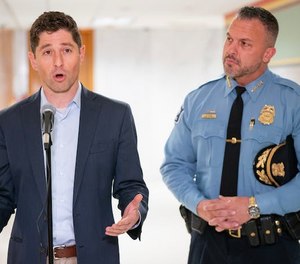By Andy Mannix
Star Tribune
MINNEAPOLIS — In an effort to curtail an unprecedented staff exodus, the city of Minneapolis and its police union signed an agreement this week to spend an estimated $15 million on cash incentives to recruit and retain more officers.
If the City Council votes to approve it, the agreement would pay $18,000 to eligible police officers in three installments over the next two and a half years, as well as $15,000 in incentive bonuses for new hires.

Minneapolis Mayor Jacob Frey, left, and Minneapolis Police Chief Brian O Hara announced an agreement over funding police retention and recruitment incentives Friday at City Hall. (Alex Kormann, Star Tribune)
The agreement would also give Minneapolis Police Chief Brian O’Hara more discretion to fill, change or leave vacant officer shifts — called “assignment bids” — which the agreement says will allow the chief to be more nimble in reacting to department needs.
Mayor Jacob Frey said in a news conference Friday his administration is working to “claw back” more managerial authority that has been “given away” in past police contracts.
“This is one important step in bringing it back so our police chief can lead, can make personnel decisions and to locate people where they’re needed most at the time they’re needed most,” he said.
The announcement comes as the city and Police Officers Federation of Minneapolis are still actively negotiating a broader contract. In a statement Friday, union President Sherral Schmidt said the “bigger issue at hand” is that Minneapolis is not paying competitive wages to attract and retain officers.
“We are grateful to get this agreement signed,” Schmidt said. “The retention and hiring incentive are a step in the right direction but will only go so far.”
As of October, the Minneapolis Police Department employed 573 officers — with 28 on long-term leave — down from about 900 in 2020, said spokesman Sgt. Garrett Parten. Frey and O’Hara say replenishing the ranks is critical to maintaining the downward trends in violent crime metrics the city has seen this year, a respite from a sharp rise in homicides and record highs in gun violence over the past three years.
“While we have slowed the pace of attrition over the course of this year, this department continues to bleed people,” said O’Hara. “And we need to stop that. We need to stop that urgently.”
The funding for the cash incentives will come from a $19 million one-time infusion of state surplus money distributed to Minneapolis for public safety aid.
Per the agreement, police officers, sergeants and lieutenants who are permanently employed and work at least 35 hours per week in Minneapolis will receive $6,000 on April 15, 2024. Two more payments of $6,000 would be paid out over the following two years. Newly hired police officers would receive $5,000 upon a completion of their probationary period, and two more installments of $5,000 over the next two years.
O’Hara said those payments are modest compared to what other cities are spending on incentives, noting that Seattle is offering $30,000 to new hires.
A City Council committee is expected to take up the agreement at a meeting scheduled for next Tuesday. Frey said he did not know how the Council will vote.
Police departments across the nation have struggled to retain and hire police officers during that time, as interest in the profession has plummeted in the face of rising public scrutiny following a series of high-profile police killings, including the 2020 murder of George Floyd. O’Hara said the problem is more acute in Minnesota, where officers are required to get a two-year college degree to be licensed, and not enough candidates are enrolling in those programs to fill the current police job vacancies.
“Quite frankly, this is the toughest job in policing in this country today,” the chief said.
Minneapolis is also facing a state mandate to reform its police department and is in the process of negotiation a consent decree with the Justice Department to resolve federal charges that it engaged in a pattern of racist and abusive behavior that deprived people of their constitutional rights.
“This is pay so that we are competitive with a number of cities,” Frey said. “We need to be holding officers accountable, and at the same time, they are doing a very tough job, and we need to make sure that we are paying for the kind of service — the kind of accountability — that we are all expecting on a daily basis.”
—
©2023 StarTribune. Visit startribune.com.
Distributed by Tribune Content Agency, LLC.


